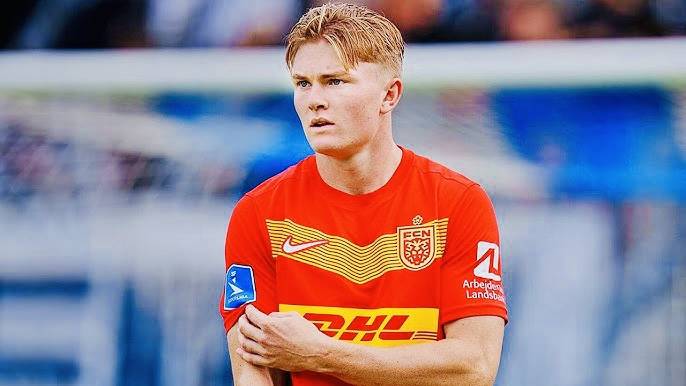Rúben Amorim, the head coach of Sporting CP, recently revealed that a Premier League club was prepared to offer a higher fee than Sporting to secure the signing of Conrad Harder. Amorim, while discussing the circumstances surrounding Harder's transfer, emphasized the competitive nature of the pursuit. This Premier League club was not only willing to match Sporting's financial terms but also proposed an arrangement that would allow Harder to stay with his current team, FC Nordsjælland, until 2025 on loan. Despite the tempting offer, the young Danish forward ultimately chose to join Sporting CP.
The club in question was Brighton & Hove Albion, a team known for its strategic approach to player recruitment and development. Brighton's interest in Conrad Harder isn't surprising, given their recent track record of scouting and nurturing young talent. The club has been active in identifying promising players from various leagues and has made a name for itself by providing a platform for young players to grow and showcase their talents in one of the most competitive leagues in the world.
For Brighton, Conrad Harder represented a valuable addition to their roster, fitting perfectly into their model of acquiring young, talented players with high potential for development and future resale value. Harder's performances at Nordsjælland had caught the attention of several top European clubs, including those from the Premier League. Brighton, aware of the competition, were prepared to make an aggressive bid to secure his signature.
Brighton's proposal was particularly interesting because it included the option for Harder to remain at Nordsjælland on loan until 2025. This kind of arrangement is increasingly common in modern football transfers, particularly for young players. Allowing a player to remain at their current club, or move to a club where they can get regular playing time, benefits all parties involved. The selling club retains a valuable asset, the player continues to develop in a familiar environment, and the buying club secures the player's rights without immediately needing to integrate them into their squad.
Despite the attractive nature of Brighton's offer, Conrad Harder chose a different path. His decision to join Sporting CP may have been influenced by a number of factors. Sporting CP, a club with a rich history of developing young talent, particularly Portuguese players who have gone on to achieve international success, could have presented a compelling vision for Harder's development. Sporting's reputation for fostering young talent and providing a clear pathway to first-team football may have been crucial in Harder's decision-making process.
Additionally, Sporting CP plays in a less financially dominant league compared to the Premier League, but one that is still competitive and known for providing a platform for young players to shine. This environment could offer Harder a greater chance of regular first-team football and less pressure than the Premier League, which is notorious for its intensity and the high expectations placed on young talents. Sporting's commitment to youth development and its track record with nurturing future stars likely appealed to Harder as he considered his next career move.
Moreover, Sporting CP's recent success, both domestically and in European competitions, may have been another factor that attracted Harder. The club has been on an upward trajectory under the management of Rúben Amorim, who has instilled a winning mentality and an exciting style of play. Amorim’s vision for the future and his emphasis on promoting young talents could have resonated with Harder, who might have seen this as the ideal environment to further his development.
Brighton's failure to secure Harder’s signature despite offering a higher fee and a loan-back option underscores the fact that football transfers are not always decided by financial considerations alone. Players, especially young ones, often look for a club where they feel they can develop best, get the most playing time, and have a realistic pathway to the first team. While Brighton offered an attractive package, Sporting CP’s proposition, coupled with their recent achievements and emphasis on youth development, evidently aligned more closely with Harder’s personal and professional ambitions.
In conclusion, Conrad Harder’s decision to join Sporting CP over Brighton despite the latter’s higher bid and attractive loan-back offer highlights the complexity of modern football transfers. It is not always the highest financial bid that wins; rather, a combination of factors, including the club’s vision, development philosophy, competitive environment, and recent success, can play a crucial role in a player’s decision. For Sporting, securing Harder’s signature represents a significant coup in the transfer market, while for Brighton, it serves as a reminder of the importance of appealing to the broader aspirations of young talents.




No comments yet
Be the first to share your thoughts!